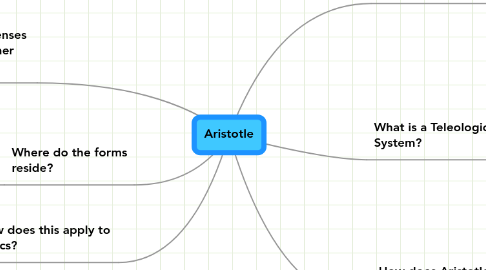
1. How do our senses differ from other animals?
1.1. All forms of life have nutritive, reproductive and locomotive power.
1.1.1. Animals differ by having the power of sensation and perception.
1.1.1.1. More complex animals have intellectual power.
1.1.1.1.1. Aristotle argues tht humans have a special intellectual power called reason, which is the ability to comprehend universals.
2. Where do the forms reside?
2.1. Aristotle believed that all forms lie inside the things themselves
2.1.1. Each thing we see is part of a goal oriented system.
2.1.1.1. The human goal is happiness.
3. How does this apply to ethics?
3.1. The final cause for humans is happiness- Eudaimonia.
3.1.1. Ethics is the study of how humans obtain happiness.
3.1.1.1. Aristotle will break down the idea scientifically and provide very specific ways for a person to become happy.
3.1.1.1.1. Aristotle says you have to practice virtue.
4. Aristotle's Biology
4.1. "All men by nature desire to know. An example is the delight we take in our senses."
4.1.1. He believes that nature does nothing by chance. We have been given our senses to use them to understand the world.
4.1.1.1. For Aristotle, to engage the problem of knowledge, we must begin with our senses.
5. How does Aristotle differ from Plato and Socrates?
5.1. Aristotle is a practical and scientific thinker.
5.1.1. He doesn't believe in the World of Forms, but thinks that everything that we can understand we can touch.
5.1.1.1. He creates and applies a scientific model to philosophical investigation.
6. What is a Teleological System?
6.1. Aristotle believed that everything in the world has causes (things that drive them to be created).
6.1.1. 1st cause: Material cause- the material from which the is made.
6.1.1.1. 2nd cause: Formal cause- the shape or form a thing must take in order to be recognized.
6.1.1.1.1. 3rd cause: Efficient cause- the actual force used to make a thing.
